|
|
|
Sort Order |
|
|
|
Items / Page
|
|
|
|
|
|
|
| Srl | Item |
| 1 |
ID:
091282
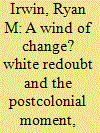

|
|
|
|
|
| Publication |
2009.
|
| Summary/Abstract |
In July 1963, U.S. Secretary of State Dean Rusk held a private meeting with Dr. Willem Naude, the ambassador from South Africa. "A rough time [is] ahead," Rusk explained as the representative sat down in his office. "We are under enormous pressure but do not intend to give in." Several members of the so-called African bloc at the United Nations had successfully protested the practice of apartheid-South Africa's system of institutionalized racial discrimination-in the Security Council that year, and pressure was rapidly mounting in the General Assembly for mandatory economic sanctions against South Africa. The ambassador looked across Rusk's desk and noted that it was "ironical" that ten years earlier they had been allies in the Cold War, and now his country was being isolated in its struggle against a "common enemy." He went on to assert, "The United States [is] to a large degree responsible for releasing these revolutionary forces in the world. The goal of a great power should be to play down tensions and try to get people to talk together, but the United States without even opening its mouth [has] released dangerous forces in the world." Rusk paused for a moment before responding, "[I wonder] if these forces [are] not deeply rooted in the nature of man. [I wonder] if this discourse has not been going on for 2,000 years. Did not man, like most animals, not like to be pushed around too much?"
|
|
|
|
|
|
|
|
|
|
|
|
|
|
|
|
| 2 |
ID:
135542
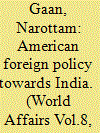

|
|
|
|
|
| Summary/Abstract |
This article contracts the American/Western judeo-Christian culture and its definition of the world with the traditional Asian/Eastern Indic perspective to explain major features of US policy towards developing countries in general and India in particular. American diplomacy so far has been dictated by the national belief in the superiority of biblical monotheism and US outreach is associated with the spread of judeo-christinity and the defeat of “paganism”. In the name of protecting religious freedom, the American government claims the right to monitor the status of religion in other countries and support Christian missionary organizations. This policy is also a tool to keep India and other countries in a subordinate role by expanding US influence in all field.
|
|
|
|
|
|
|
|
|
|
|
|
|
|
|
|
| 3 |
ID:
117109
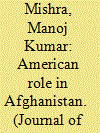

|
|
|
| 4 |
ID:
142225
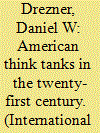

|
|
|
|
|
| Summary/Abstract |
Think tanks have been a part of the United States’ foreign policy establishment for more than a century. They have played a significant role at key junctures in US foreign policy. Two inflection points, however, have dramatically altered the think tank landscape in the last 15 years. The 11 September 2001 terrorist attacks caused these organizations to dramatically expand their staff and overhead, as the demand for their services increased. The 2008 financial crisis subsequently left many of these same think tanks financially overextended. This circumstance forced these organizations to seek out more unconventional funding arrangements, imposing new constraints at the exact moment that their competitive environment intensified. In the twenty-first century, US foreign policy think tanks will maintain their relevancy by moving beyond what made them relevant in the last century.
|
|
|
|
|
|
|
|
|
|
|
|
|
|
|
|
| 5 |
ID:
123194
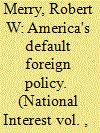

|
|
|
|
|
| Publication |
2013.
|
| Summary/Abstract |
PRESIDENT OBAMA'S June 13 decision to send light weapons and ammunition to Syrian rebels reflects a fundamental reality in the dialectic of American foreign policy. Within this administration and indeed throughout official Washington, humanitarian interventionism is the inevitable default position for policy makers and political insiders. There is no intellectual counterweight emanating from either party that poses a significant challenge to this powerful idea that America must act to salve the wounds of humanity wherever suffering is intense and prospects for a democratic emergence are even remotely promising.
|
|
|
|
|
|
|
|
|
|
|
|
|
|
|
|
| 6 |
ID:
138297
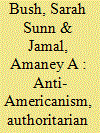

|
|
|
|
|
| Summary/Abstract |
A pillar of American foreign policy in the Middle East since September 11, 2001, has been promoting democracy, with particular emphasis on support for women's representation. Given high levels of anti-Americanism in the region, does foreign pressure for policy reform undermine this project? Evidence from a nationally representative survey experiment in Jordan shows that an American endorsement of women in politics has no average effect on popular support for women's representation. Instead, domestic patterns of support and opposition to autocrats determine citizens' receptivity to policy endorsements, with policy endorsements of foreign-supported reforms polarizing public opinion. Both foreign and domestic endorsements of women in politics depress support among Jordanians who oppose their regime significantly more than among Jordanians who support it.
|
|
|
|
|
|
|
|
|
|
|
|
|
|
|
|
| 7 |
ID:
121408
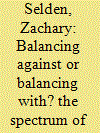

|
|
|
|
|
| Publication |
2013.
|
| Summary/Abstract |
During the 2001-2009 period when American foreign policy was internationally unpopular and perceived as unilateral, many states strengthened their security cooperation with the United States and facilitated the reach of the us military. This behavior spans a range of actions along a spectrum from reaffirming traditional alliances to far more subtle forms of alignment. This pattern is in large part driven by the actions of regional powers such as Russia and China whose rising power pushes neighboring states to seek the assurance of the United States, and it has distinct implications for the endurance of American hegemony. As those regional powers seek to expand their influence, secondary states may increase their contributions to the maintenance of American hegemony, thus helping to extend it well into the future. They are less prone to do so, however, if the United States follows a strategy of restraint that calls into question its willingness to defend its hegemony. Therefore, a policy focused on maintaining American military preeminence and the demonstrated willingness to use it may be what sustains the cooperation from second-tier states that helps to maintain American hegemony.
|
|
|
|
|
|
|
|
|
|
|
|
|
|
|
|
| 8 |
ID:
096930
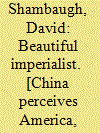

|
|
|
|
|
| Publication |
Princeton, Princeton University Press, 1991.
|
| Description |
xiv, 326p.
|
| Standard Number |
0691078645
|
|
|
|
|
|
|
|
|
|
|
|
Copies: C:1/I:0,R:0,Q:0
Circulation
| Accession# | Call# | Current Location | Status | Policy | Location |
| 055232 | 973.92/SHA 055232 | Main | On Shelf | General | |
|
|
|
|
| 9 |
ID:
141965
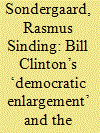

|
|
|
|
|
| Summary/Abstract |
Faced with creating a grand strategy for American foreign policy in the post–Cold War world, the Clinton Administration launched the strategy of ‘Democratic Enlargement.’ This analysis makes two contributions to the existing literature on the topic. First, it investigates the role of Wilsonianism and the ‘Democratic Peace Thesis’ in the discourse of the strategy of ‘Democratic Enlargement’ based on public speeches with a focus on the relationship between democracy and security. Second, it utilises securitisation theory to analyse how Clinton’s Administration used the linkage of democracy and security to legitimise humanitarian interventions in Haiti and Kosovo. By addressing ‘Democratic Enlargement’ in security terms, the Administration securitised democracy promotion and, thereby, created a discourse that helped legitimise a gradual move towards a more militaristic foreign policy during Clinton’s presidency. This discourse offered arguments later utilised by the George W. Bush Administration.
|
|
|
|
|
|
|
|
|
|
|
|
|
|
|
|
| 10 |
ID:
147104
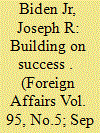

|
|
|
|
|
| Summary/Abstract |
The next administration will take the reins of American foreign policy in a world that is more complex than at any point in our modern history, including the twilight of the Cold War and the years that followed the 9/11 attacks. But it is also the case that despite the proliferation of threats and challenges—some old, some new—by almost any measure, we are stronger and more secure today than when President Barack Obama and I took office [1] in January 2009. Because of our investments at home and engagement overseas, the United States is primed to remain the world’s preeminent power for decades to come. In more than 40 years of public service, I have never been more optimistic about America’s future—if only we continue to lead.
|
|
|
|
|
|
|
|
|
|
|
|
|
|
|
|
| 11 |
ID:
120958
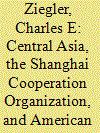

|
|
|
|
|
| Publication |
2013.
|
| Summary/Abstract |
This paper examines U.S. engagement in Central Asia over the past two decades, with specific reference to the Shanghai Cooperation Organization. While alarmist voices occasionally warn of the threat to American interests from China and Russia through the SCO, the organization's influence appears limited. Washington has engaged it only sporadically, preferring to conduct relations bilaterally with the Central Asian states.
|
|
|
|
|
|
|
|
|
|
|
|
|
|
|
|
| 12 |
ID:
145200
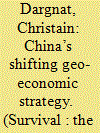

|
|
|
|
|
| Summary/Abstract |
Against an international backdrop of slowing global trade and the rise of the service industry over manufacturing, the Chinese economic model is approaching exhaustion. China is struggling to confront over-indebtedness, excess production capacity, declining competitiveness, unfavourable demographics and the flight of capital. In response, the Chinese government is adopting a change in geo-economic strategy, based on two major initiatives: a transformation of its domestic financial system, and the ‘One Belt, One Road’ (OBOR) project. The success of these initiatives will be vital to China’s economic development, political and social stability, and geopolitical emergence.
|
|
|
|
|
|
|
|
|
|
|
|
|
|
|
|
| 13 |
ID:
116210
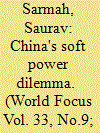

|
|
|
| 14 |
ID:
153551
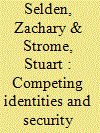

|
|
|
|
|
| Summary/Abstract |
The United States and India have forged a remarkably close security relationship since 2000, given the previous hostility of India to American foreign policy in general. Indian state identity until the mid-1990s was shaped by nonalignment and antipathy to the US-led liberal economic order. If identity is the source of interests, then how do states adopt policies that conflict with core elements of their identity when geopolitical shifts push states to adapt to a new regional balance of power? We argue that India did this by activating parts of the state identity that were compatible with American state identity and de-emphasizing those elements that were incompatible. But in doing so, Indian state identity changed, which impacts future foreign policy choices. This case illustrates the reciprocal relationship between security interests and state identity. We use content analysis of ten years of Indian media to demonstrate that the depiction of the US–Indian relationship increasingly focused on the democratic shared values of both states, despite beginning with an emphasis on military cooperation.
|
|
|
|
|
|
|
|
|
|
|
|
|
|
|
|
| 15 |
|
| 16 |
ID:
139591
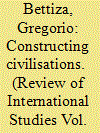

|
|
|
|
|
| Summary/Abstract |
Since 11 September 2001, the ‘Muslim world’ has become a novel religio-culturally defined civilisational frame of reference around which American foreign policy has been partly reoriented and reorganised. In parallel, the ‘Muslim world’, is increasingly becoming, at this historical juncture, a civilisational social fact in international politics by being progressively embedded in, and enacted onto the world by, American foreign policy discourses, institutions, practices, and processes of self-other recognition. This article theoretically understands and explains the causes and consequences of these changes through an engagement with the emerging post-essentialist civilisational analysis turn in International Relations (IR). In particular, the article furthers a constructivist civilisational politics approach that is theoretically, empirically, and methodologically oriented towards recovering and explaining how actors are interpreting, constructing, and reproducing – in this case through particular American foreign policy changes – an international society where intra- and inter-civilisational relations ‘matter’.
|
|
|
|
|
|
|
|
|
|
|
|
|
|
|
|
| 17 |
ID:
097914
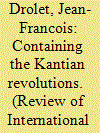

|
|
|
|
|
| Publication |
2010.
|
| Summary/Abstract |
This article examines the neo-conservative critique of global liberal governance. It provides a theoretically oriented assessment of the neo-conservative case against international law and human rights regimes, and draws out the main political and ethical implications for American democracy and American foreign policy. It is argued that the neo-conservative critique of global governance rests upon an interpretation of the normative order that weaves together democracy, individual rights and national autonomy through a volatile identity politics which is fundamentally at odds with both the pluralist character of 'Westphalian diplomacy' and the universal order of rights envisaged by advocates of global governance. More than just the policy autonomy of the US, what is really at stakes in those debates for neo-conservatives is the whole structure of cultural and socio-economic interests that is tied to the substantive interpretation of democracy upon which their domestic commitments to neo-liberal capitalism and liberal freedoms are predicated.
|
|
|
|
|
|
|
|
|
|
|
|
|
|
|
|
| 18 |
ID:
106267
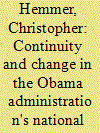

|
|
|
|
|
| Publication |
2011.
|
| Summary/Abstract |
This article examines the Obama Administration's recently released National Security Strategy (May 2010) and compares it with its predecessors. While consistent with its predecessors in its definition of American interests, its stress on U.S. global leadership, and the importance of American values in its foreign policy, it differs from the strategy released by the George W. Bush Administration by offering a more complex view of the international threat environment, favoring multilateralism, stressing America's example over its military might, and in acknowledging the limits of American resources. The fundamental flaw of the current National Security Strategy, a flaw it shares with all its predecessors, is that it ignores concessions, tradeoffs, and hard choices inherent in American foreign policy.
|
|
|
|
|
|
|
|
|
|
|
|
|
|
|
|
| 19 |
ID:
119437
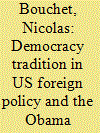

|
|
|
|
|
| Publication |
2013.
|
| Summary/Abstract |
This article proposes a three-level analysis of the democracy tradition in American foreign policy that identifies its ideational, strategic and policy dimensions and situates Barack Obama's presidency to date within it at each level. At the heart of this approach is the understanding that the motivations and practice of the United States' democracy promotion are shaped by its ideas about national identity, political order, national interest and international relations.
This is the ideational source of the democracy tradition, which, as US power has grown, has led increasingly to decision-makers setting strategic goals that include democratization abroad as a facilitator of other US goals. Only slowly has this led to the development of specific policies to that end, though, and democracy promotion as a discrete policy field mostly developed from the 1980s onwards. Democracy promotion went through a 'boom' after the end of the Cold War as the United States enjoyed unparalleled power on the international stage.
It is clear that Barack Obama and his administration belong firmly in the democracy tradition at the ideational, strategic and policy level, and they have given no cause to expect any major change in his second term as far as democracy promotion is concerned. It is in any case a mistake to think that changes in the democracy tradition come from particular leaders; rather, it is the changing international environment confronting US foreign policy that is more likely, in the longer term, to lead to a shift away from democracy promotion.
|
|
|
|
|
|
|
|
|
|
|
|
|
|
|
|
| 20 |
ID:
112115
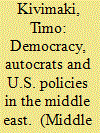

|
|
|
|
|
|
|
|